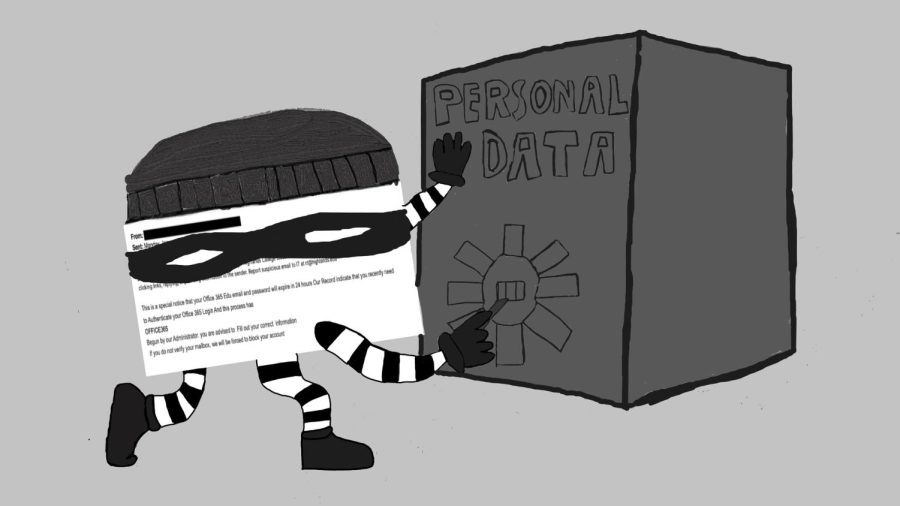Students and faculty should be aware of phishing scams
Phishing is one of the most common scams people can come across. Recognizing the signs of a phishing attack is crucial in avoiding one as they can be dangerous.
January 27, 2023
Students and faculty have been receiving emails from outside organizations for the past few years with many presented as if they are from GHC. Some of these emails have convinced students and faculty to provide their personal information, putting themselves and the school at risk of scammers.
Certain emails may seem more trustworthy than others, even if they are unknowingly sent by a scammer. It is important for students and faculty to look for the signs of phishing before responding, especially if an email asks for personal or financial information.
GHC will never ask for passwords, Social Security numbers or driver’s license numbers. If someone receives an email from GHC asking for any of these, it is likely a scam and should be reported to IT at rt@highlands.edu to prevent future harm.
There are several ways to tell if an email is a scam. Students and faculty should check the sender before reading a message. Phishing scammers can pose as an organization or as another student, teacher or coworker. Someone should report the email or contact the alleged sender in person if something seems strange to make sure they are not being scammed.
The most common phishing scams at GHC are messages meant to make someone believe they have made a mistake, such as forgetting to make an invoice payment. Another common sign of phishing is when an email wants a student to click a link to another site. Grammatical errors or awkward phrases should also be looked for.
Some students have received emails with subjects like “IT DESK,” “WORK WITH US,” “PERSONAL ASSISTANT” and “APPLY NOW” in the past. Many scam emails have encouraged students to apply for job positions that do not exist.
“Always be skeptical and avoid any emails that have any offers that seem too good to be true,” Mohan Naidu, assistant professor of computer science, said.
Some students have also been victims of “sextortion” scams, where scammers try to convince them that they’ve hacked into their camera and recorded an inappropriate video of them.
Somewhat similarly, employees have reported emails from Gmail or Yahoo from people pretending to be higher-ups. They ask faculty members to buy gift cards and then text codes to a phone number.
There are dangers associated with falling victim to phishing scams. A student or faculty member could allow a scammer access to their computer by clicking on certain links or providing information. Then the phisher can hack into the college system and retrieve data and information on various people and accounts.
Some phishing emails also include malware, which can infect someone’s computer and leak personal information and finances.
Other emails steal passwords to use across different websites, which is why students and faculty should use a different password for each new site.
“Many people reuse passwords across multiple websites and when a big data breach happens somewhere like Twitter or LinkedIn, hackers share and sell stolen usernames and passwords online, where it can be used to break into accounts and to perpetuate these scams,” Ian Fleming, chief information security officer, said.
“I have gotten some scam emails, but I don’t pay too much attention to them,” Guadalupe Delgado, Marietta campus general studies major, said. “I end up deleting them afterwards once they send an email saying ‘Do not trust these scams.’”
Students and faculty can use the Phish Alert button on Outlook to automatically forward a suspicious email to IT. Reporting these scams can help protect other GHC students and staff and reduce the number of those that fall victim to them.







































































